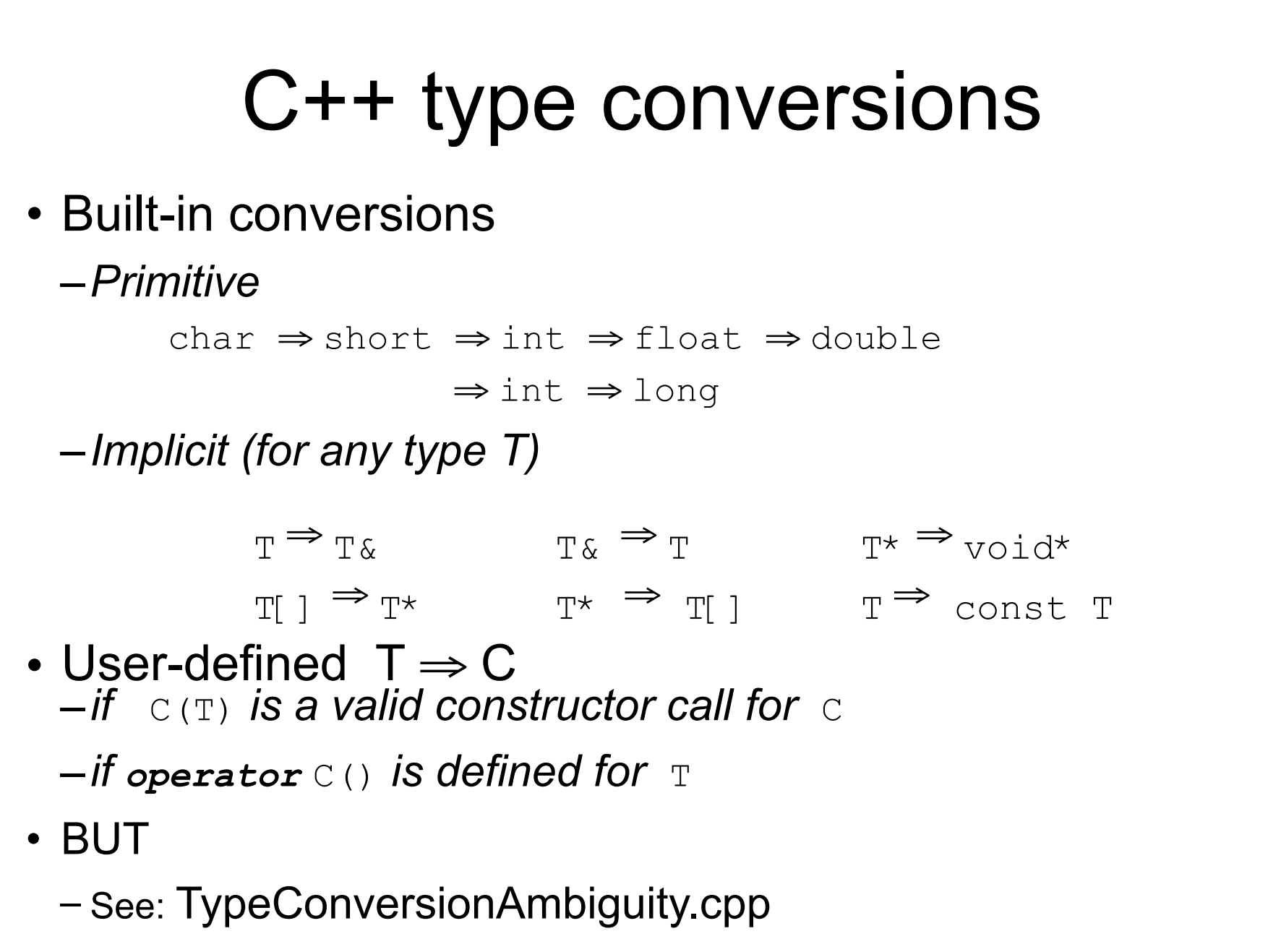Overloaded operators¶
可以让用户定义的类型像原生类型一样具有运算的能力。
- Allows user-defined types to act like built in types.
- Another way of function call
可以被重载的运算符
不能重载的运算符
. .* :: ?: sizeof typeid static_cast dynamic_cast const_cast reinterpret_cast
a+b 我们可以通过 a 的类型 (receiver) 来决定我们的运算符,但 a>b?a:b 没有 receiver.
typeid 获取类的方式。可以用 VPTR 表示(如果有虚函数)
Restrictions
- Only existing operators can be overloaded.
不能重载不存在的运算符,如 Python 的**但重载时可以毫无顾忌运算符原来的语义(如重载+, 但实际上是做减法) - Operators must be overloaded on a class or enumeration type
- Overloaded operators must
- Preserve number of operands
如对于除法/, 它重载时必须也是双目的。 - Preserve precedence
优先级和结合律是不变的
- Preserve number of operands
C++ overloaded operator¶
Just a function with an operator name.
使用 operator 关键字作为前缀,后面跟上运算符。operator *(...)
- Can be a member function
- Implicit first argument
const String String::operator + (const String &that)
- Implicit first argument
- Can be a global(free) function
- Both arguments explicit
这两种写法是一样的,但是不能同时存在。
- Both arguments explicit
How to overload¶
- As a member function
- Implicit first argument
- No type conversion performed on reveiver
这里我们不希望返回的对象被修改,否则可能出现
class A { public: A(int ii):i(ii){} int get() {return i;} /* 返回的一定是 A 的一个新的对象 */ const A operator+(const A &that) const { A c(this->i+that.i); /* 这里可以访问 that. 私有是针对类的,不是针对对象的。 */ return c; } private: int i; } int main() { A a = 6; A b = 7; A c = a + b; /* a + 9 也是可以的;但 9 + a 不行 */ cout << c.get() << endl; /* 输出 13 */ }(a+b) = a的情况。
如果c = a + 9编译器会用 9 帮我们构造一个对象。 - 二元运算符需要一个参数,一元运算符不需要参数。
e.g.-a, +a, *p, !a, ~b
- As a global function
- Explicit first argument
- Developer does not need special access to classes
- May need to be a friend
这里全局函数是不能访问类的私有变量的。因此要
friend const A operator - (const A&r, const A&l)声明友元。 这样就可以写A c = 9-b;但A c = 9-7;不会重载。
Members vs. Free Functions
- Unary operators should be members.
- assignment
= () [] -> ->*must be memebers; - All other binary operators as non-members.
Argument Passing¶
- if it is read-only pass it in as a const reference (except built-ins)
- make member functions const that don't change the class (boolean operators, +, -, etc)
- for global functions, if the left-hand side changes pass as a reference (assignment operators)
- Select the return type depending on the expected meaning of the operator.
如加减乘除只能作为右值,因此要 const. 而[]可以作为左值,就不能 const.
The prototypes of operator
+ - * / % ^ & | ~
const T operator X(const T&l, const T&r);
这里返回的必须是一个新的对象。如果这里返回引用,那必须返回一个全局的地址,但函数只有本地空间。! && || < <= == >= >
bool operator X(const T&l, const T&r);[]
返回的是左值(不能为 const),而且不能是一个新对象(否则a[6]=7执行后就被丢掉了)
E& T::operator[](int index);
class Integer {
public:
...
const Integer& operator++(); //prefix++
const Integer operator++(int); //postfix++
const Integer& operator--(); //prefix--
const Integer operator--(int); //postfix--
...
};
//
const Integer& Integer::operator++() {
*this += 1; // increment
return *this; // fetch
}
// int argument not used so leave unnamed so
// won't get compiler warnings
const Integer Integer::operator++( int ){
Integer old( *this ); // fetch
++(*this); // increment 调用了刚刚的函数
return old; // return
++a, 第二个是后缀 a++.要 overload
+= 运算符,可以直接写 i++ 后返回 *this, 节省开销,不用新建对象。
++x; // calls x.operator++();
x++; // calls x.operator++(0);
--x; // calls x.operator--();
x--; // calls x.operator--(0);
Relational operators
class Integer {
public:
...
bool operator==( const Integer& rhs ) const;
bool operator!=( const Integer& rhs ) const;
bool operator<( const Integer& rhs ) const;
bool operator>( const Integer& rhs ) const;
bool operator<=( const Integer& rhs ) const;
bool operator>=( const Integer& rhs ) const;
}
bool Integer::operator==( const Integer& rhs ) const {
return i == rhs.i;
}
// implement lhs != rhs in terms of !(lhs == rhs)
bool Integer::operator!=( const Integer& rhs ) const {
return !(*this == rhs);
}
bool Integer::operator<( const Integer& rhs ) const {
return i < rhs.i;
}
// implement lhs > rhs in terms of lhs < rhs
bool Integer::operator>( const Integer& rhs ) const {
return rhs < *this;
}
// implement lhs <= rhs in terms of !(rhs < lhs)
bool Integer::operator<=( const Integer& rhs ) const {
return !(rhs < *this);
}
// implement lhs >= rhs in terms of !(lhs < rhs)
bool Integer::operator>=( const Integer& rhs ) const {
return !(*this < rhs);
}
Operator []
认为这个类是一个容器
stream extractor/inserter
ostream 不能是 const, 因为往里面输出会修改 cout 内部。cout << a << 5; 这里实际上是先执行 cout << a; 再执行 (cout << a) << 5. 因此返回类型必须是 ostream.这里也要声明友元。
istream& operator>>(istream& is, T& obj) { // 这里没有 const, 因为要往里写入
// specific code to read obj
return is;
}
You can define your own manipulators.
ostream& manip(ostream& out) {
...
return out;
}
ostream& tab ( ostream& out ) {
return out << '\t';
}
cout << "Hello" << tab << "World!" << endl;
Copying vs. Initialization¶
- Assignment Operator
- Must be a member function
必须是成员函数 - Will be generated for you if you don't provide one –Same behavior as automatic copy ctor -- memberwise assignment
- Check for assignment to self
拷贝构造之前,内存的指针p是没有值的,但是赋值的时候p是有值的。所以需要先delete p再new. 但如果是自己赋值给自己,源操作的内存已经被delete掉了。 - Be sure to assign to all data members
- Return a reference to
*this
- Must be a member function
Type Conversion¶
User-defined Type conversions
(int)3.5 单目的运算符,可以重载
class PathName {
string name;
public:
// or could be multi-argument with defaults
PathName(const string&);
~ PathName();
};
...
string abc("abc");
PathName xyz(abc); // OK!
xyz = abc; // OK abc => PathName
abc 构造一个 PathName 的对象,随后赋值给 xyz.以其他变量为参数的构造函数可以帮助我们做赋值。
我们在构造函数前面加上
explicit 关键字,即 explicit PathName(const string&); 即我们的构造函数只能用来做构造,不能把 string 对象赋值给 PathName.这样编译时就会出错。
Conversion operations
- Operator name is any type descriptor
- No explicit arguments
- No return type
- Compiler will use it as a type conversion from \(X \Rightarrow T\)
class Rational {
public:
...
operator double() const; // Rational to double
}
Rational::operator double() const {
return numerator_/(double)denominator_;
}
Rational r(1,3);
double d = r; // r=>double
不需要写返回类型。
如果我们在重载的运算符前面加上 explicit, 那么我们就必须写作 double d = (double)r;

想将 T 转化为 C, 那么需要一个 C(T) 的不加 explicit的构造函数,或者 operator C() 的重载。如果两个都有,编译器会出错。
Use explicit conversion functions.
最后更新:
2023年5月25日 19:21:37
创建日期: 2023年5月9日 22:51:14
创建日期: 2023年5月9日 22:51:14